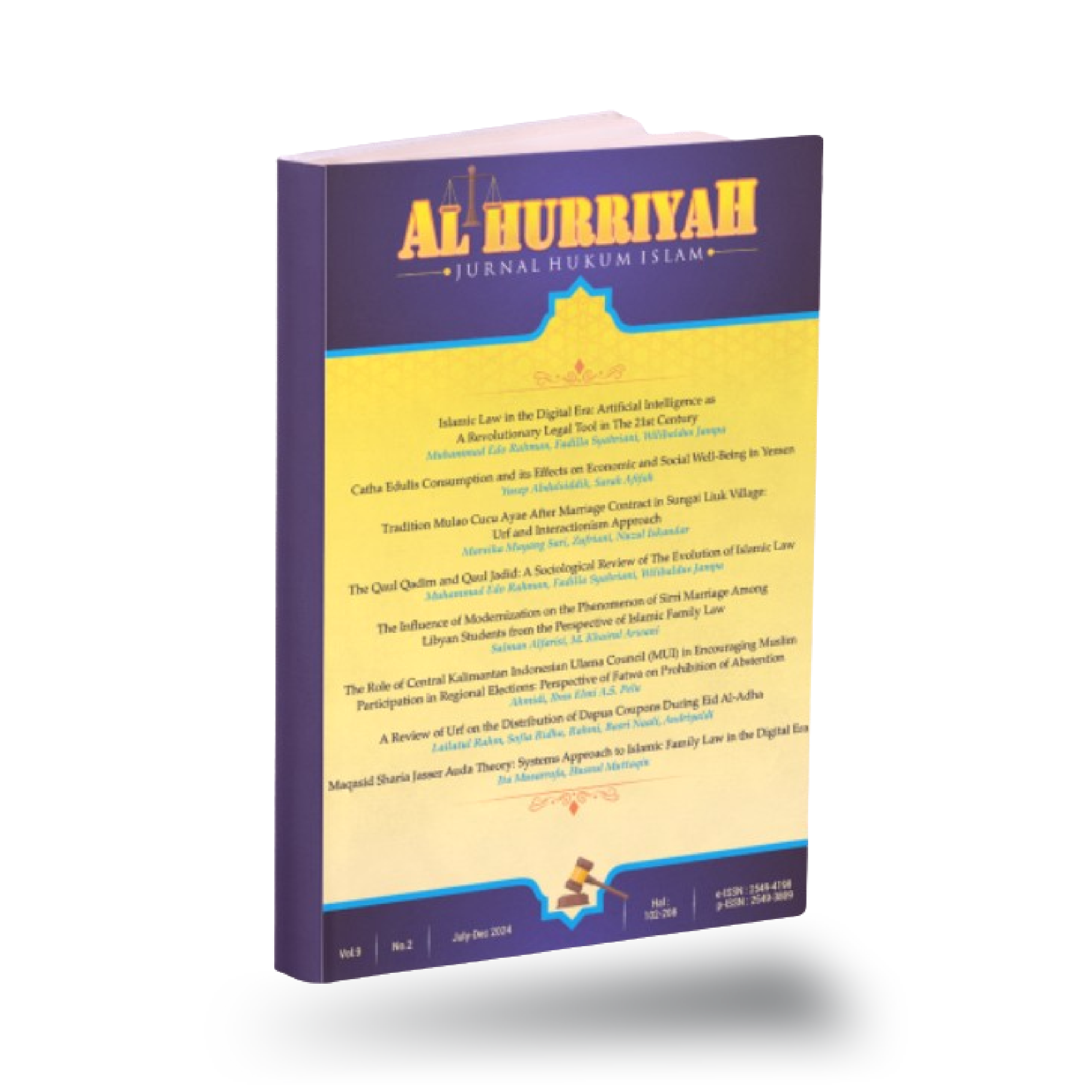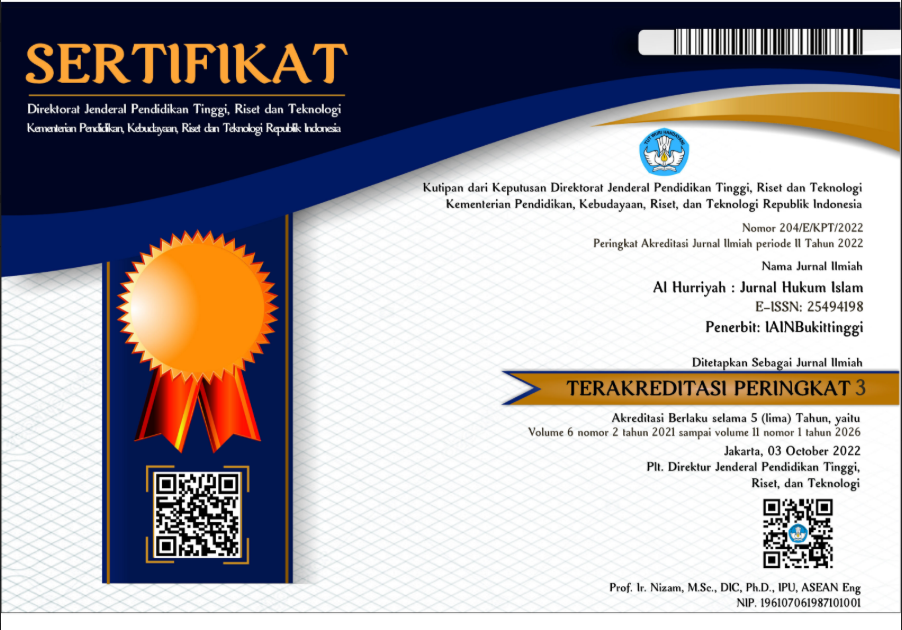Deconstructing Sharia: A Critical Study of Abdullah Al-Naim's Thought on Naskh
DOI:
https://doi.org/10.30983/alhurriyah.v9i1.7973Keywords:
Abdullah al-Na’im, Sharia Deconstruction, Nasikh MansukhAbstract
This paper explains how Abdullah al-Naim's sharia formulation serves as a problem-solving solution for numerous issues facing the ummah in recent times. Abdullah al-Naim is a Muslim intellectual who is concerned with reforming Sharia to make it relevant to human rights. This reformation comes from the assumption that the sharia formulation in certain aspects is considered to be irrelevant to modern life. It is even considered to be contrary to universal human rights. So, a demand to build a Sharia model with modern public standards arises, especially in relation to human rights. Using a descriptive-analytic method, this paper concludes that the sharia deconstruction he proposes can be seen as a new approach that is extremely intolerant of the rigidity and uniformity of texts, necessitating the destruction of the text's real meaning. Thus, he introduced a method known as the evolution of Sharia (nasakh), which is seen as a modern ijtihad method. This method for the evolution of Sharia provides a model for creating modern Sharia. The concept of al-Naim’s naskh cannot be taken as it is because rational and scientific validity are used as measures of determining truth, and human values are used as goals by putting aside divine values.
References
Ahmed, Istiaq. 1993. “Abdullah An-Na’im an Constitutional and Human Rights Issues.” In Islamic Law Reform and Human Rights: Challenges and Rejoinders, edited by Karl Vogt. Oslo: Human Rights Publication.
Albab, Ulul. 2019. “Interpretasi Dialog Antar Agama Dalam Berbagai Prespektif, Al-Mada.” Journal Agama, Sosial, dan Budaya 2, no. 1 (February 14).
al-Qaradhawi, Yusuf. 2001. al-Madkhal li Dirasah al-Syari’ah. Kairo: Maktabah Wahbah.
al-Zarqani, Abdul ‘Azim. 1908. Manahil A-’Irfan fi ‘Ulum al-Qur’an, Vol. 2. Mesir: Al-Halabiy.
al-Na‘im, Abdullah. 1988. “Mahmoud Muhammed Thaha And Crisis in Islamic Law Reform: Implications for Interrreligious Relations.” Journal of Ecumenical Studies 25, no. 1. Temple University.
al-Na‘im, Abdullah Ahmed. 1990. Toward an Islamic Reformation: Civil Liberties, Human Rights and International Law. Syracuse: Syracuse University Press.
Assyaukanie, Luthfi. 1998. “Tipologi dan Wacana Pemikiran Arab Kontemporer.” Journal Pemikiran Islam Paramadina 1, no. 1.
Busyro. 2014. “Abdullah Ahmad al-Naim dan Konsep Pemikiran Hukum Liberalnya.” Jurnal al-Hurriyah 15, no. 2.
Coir, Tholhatur. 2009. Islam dalam Berbagai Pembacaan Kontemporer. Yogyakarta: Pustaka Pelajar.
Coulson, Noel. 1978. A History of Islamic Law. Edinburgh: Edinburgh University Press.
Dahlan, Moh. 2009. Abdullah Ahmad Al-Na’im: Epistemologi Hukum Islam. Yogyakarta: Pustaka Pelajar.
Efendi, Satria. 1997. “Ijtihad Sepanjang Sejarah Hukum Islam: Memposisikan KH Ali Yafie.” In Wacana Baru Fiqh Sosial; 70 Tahun KH Ali Yafie, edited by Jamal D. Rahman, 70. Bandung: Mizan.
Esposito, John L., ed. 1995. The Oxford Encyclopedia of The Modern Islamic World, Vol. IV. New York: Oxford University Press.
Fanani, Muhyar. 2002. Abdullah Ahmed al-Na’îm: Paradigma Baru Hukum Publik Islam. Yogyakarta: Jendela.
Faridah. 2020. Pemikiran Abdullah al-Na’im tentang Nasikh Mansukh. Banjarmasin: Universitas Negeri Antasari.
Gafnel, Gafnel, Ismail Ismail, and Yaswirman Yaswirman. “Human Rights and Customary Law Analysis: Uncovering the Exploitation of Children and Women in Developing Countries.” Hakamain: Journal of Sharia and Law Studies 2, no. 2 (July 5, 2024): 174–85. https://doi.org/10.57255/hakamain.v2i2.325.
Hasan, Ahmad. 1988. The Early Development of Islamic Jurisprudence. Pakistan: Islamic Research Institute.
Ibn Jauziy, Ibn Muhammad. 1405. Nawasikh al-Qur’an. Beirut: Dar Kutub al-Ilmi.
Iskandar, Pronoto. 2013. “Kontribusi Seorang Warga Muslim Global dalam Abdullah al-Na’im.” In Muslim dan Keadilan Global. Yogyakarta: IMR Press.
Juhaya, Praja. 2000. “Dinamika Pemikiran Hukum Islam.” In Sejarah dan Perkembangan Hukum Islam, edited by Jalan Mubarok. Bandung: Ramaja Rosda Karya.
Kamali, Muhammad Hashim. 1991. Principles of Islamic Jurisprudence. Cambridge: The Islamic Society.
Mahmoud, Mohamed. 2007. Pemikiran Islam dari Sayyid Ahmad Khan hingga Nasr Hamid Abu Zayd. Translated by Wakhid Nur Effendi. Jakarta: Erlangga.
Muzaki, Harir. 2005. “Reinterpretasi Hukum Pidana Islam, Perspektif Abdullah Ahamed al-Na’im.” Journal Cendikia Kependidikan dan Kemasyarakatan 3, no. 2.
Muzir, Inyiak Ridwan. 2006. “Pengantar Penerjemah: Dekonstruksi: Sebuah Perkenalan Singkat.” In Membongkar Teori Dekonstruksi Jacques Derrida. Yogyakarta: Ar-Ruzz Media.
O. Voll, John. 2001. Makers of Contemporary Islam. Oxford: Oxford University Press.
Rahman, Fazlur. 1979. Islam. Chicago: University of Chicago.
Syaukani, Imam. 2006. Rekonstruksi Epistemologi Hukum Islam Indonesia dan Relevansinya Terhadap Pembangunan Hukum Nasional. Jakarta: Raja Grafindo Persada.
Taufiq, Ahmad. 2018. “Pemikiran Abdullah al-Na’im tentang Dekonstruksi Syariah sebagai Sebuah Solusi.” International Journal Ihya’ Ulum al-Din 20, no. 2.
Zayd, Nasr Abu. 2006. Reformation of Islamic Thought. Amsterdam: Amsterdam University Press.
Zulkifli. 2020. Pemikiran Abdullah al-Na’im Tentang Relasi Islam dan Negara. Tangerang Selatan: Pustaka Pedia.
Downloads
Published
How to Cite
Issue
Section
Citation Check
License
Copyright (c) 2024 Shofiatul Jannah, Hairus Saleh

This work is licensed under a Creative Commons Attribution-ShareAlike 4.0 International License.
Authors who publish with this journal agree to the following terms:
- Authors retain copyright and grant the journal right of first publication with the work simultaneously licensed under a Creative Commons Attribution-ShareAlike 4.0 International License that allows others to share the work with an acknowledgment of the work's authorship and initial publication in this journal.
- Authors are able to enter into separate, additional contractual arrangements for the non-exclusive distribution of the journal's published version of the work (e.g., post it to an institutional repository or publish it in a book), with an acknowledgment of its initial publication in this journal.
- Authors are permitted and encouraged to post their work online (e.g., in institutional repositories or on their website) prior to and during the submission process, as it can lead to productive exchanges, as well as earlier and greater citation of published work (See The Effect of Open Access).





